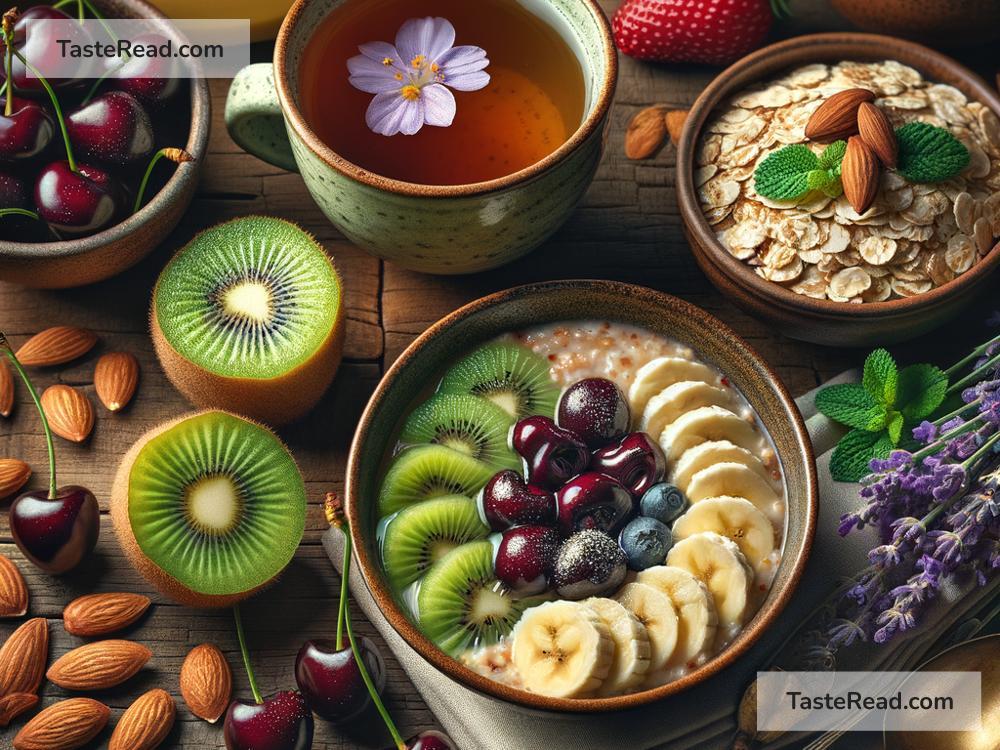Foods That Can Help You Sleep Better
We all know how important sleep is for our health and well-being. A good night’s sleep refreshes your body, sharpens your mind, and improves your mood. But if you’ve ever struggled with insomnia or restless nights, you know how frustrating it can be to wake up feeling exhausted. The good news is that certain foods can help improve your sleep architecture — the structure and quality of your sleep.
In this article, we’ll explore foods that promote better sleep and how they work. You can easily add these into your daily diet to help you fall asleep faster, stay asleep longer, and wake up feeling refreshed.
What Is Sleep Architecture?
Before diving into specific foods, let’s quickly discuss sleep architecture. Your sleep is made up of different cycles: light sleep, deep sleep, and REM (rapid eye movement) sleep. Each of these stages plays a role in restoring your body and brain. Good sleep architecture means that you cycle smoothly through these stages without interruptions.
If your sleep architecture is disrupted — for example, if you wake up frequently or don’t spend enough time in deep sleep — you might feel tired and groggy the next day. Improving your diet can help regulate your sleep cycles naturally.
The Connection Between Food and Sleep
Your diet has a direct impact on your sleep because certain nutrients influence the production of sleep-related hormones, such as melatonin and serotonin. Melatonin is often called the “sleep hormone” because it signals to your body that it’s time to sleep. Serotonin, on the other hand, helps you relax and feel calm, priming you for sleep.
Eating foods rich in sleep-supporting nutrients can make it easier for your body to transition into sleep and maintain healthy sleep architecture.
Best Foods for Supporting Sleep
Here are some foods that can help you improve your sleep:
1. Bananas
Bananas are a great option for winding down before bed. They contain magnesium and potassium, two minerals that relax muscles and reduce tension. Bananas are also rich in vitamin B6, which helps your body produce melatonin.
Try eating a banana as a bedtime snack or blend it into a calming smoothie for a soothing treat.
2. Almonds
Almonds are packed with magnesium, an essential nutrient for sleep. Magnesium helps reduce stress and supports healthy muscle and nerve function, which can lower the chances of tossing and turning at night. Almonds also contain protein, which helps stabilize your blood sugar levels while you sleep.
Snack on a small handful of almonds an hour before bed for better rest.
3. Milk
You’ve probably heard of drinking warm milk to help you sleep — and there’s truth to this traditional remedy! Milk contains tryptophan, an amino acid that helps your body produce serotonin and melatonin. It also provides calcium, which supports the brain in processing sleep-inducing chemicals.
Warm up a small glass of milk and sip it before bedtime for a calming ritual.
4. Oatmeal
Oatmeal isn’t just great for breakfast; it can also help at night. Oats are rich in magnesium and potassium, which help relax your body. They’re also high in complex carbohydrates, which can boost serotonin and melatonin levels.
For a comforting evening snack, cook a bowl of oatmeal and sweeten it with honey or add some fruit for extra nutrients.
5. Cherries
Cherries, especially tart cherries, are one of the few natural food sources of melatonin. Eating cherries (or drinking tart cherry juice) can help you fall asleep faster and stay asleep longer.
Enjoy fresh cherries as a sweet treat or drink a small glass of tart cherry juice before bed for better sleep architecture.
6. Kiwi
Kiwi is an unsung hero when it comes to sleep-friendly foods. It’s high in antioxidants, such as vitamins C and E, as well as serotonin, which helps regulate sleep. Research even suggests that eating two kiwis before bedtime may significantly improve sleep quality.
Make a habit of snacking on kiwis in the evening to promote restful sleep.
7. Fatty Fish
Fish like salmon, tuna, and mackerel are rich in omega-3 fatty acids and vitamin D, both of which support serotonin production. Serotonin helps calm the mind and prepares you for sleep. Fatty fish can also improve REM sleep, the stage associated with dreaming and memory processing.
Consider having a delicious, fish-based meal for dinner a few times a week to promote better sleep.
Foods to Avoid Before Bed
On the other hand, certain foods can interfere with your sleep. Avoid heavy, greasy foods, spicy dishes, and caffeinated drinks in the evening. These can cause discomfort, indigestion, or restlessness, making it harder to fall asleep.
Similarly, try not to consume sugar-laden snacks or energy drinks before bed, as they can spike your blood sugar and disrupt sleep cycles.
Final Thoughts
Improving your sleep architecture doesn’t always mean you have to rely on sleep aids or medications. Sometimes, a simple change to your diet can make a big difference. Incorporating sleep-supporting foods like bananas, almonds, milk, cherries, and fatty fish into your daily routine can help your body prepare for rest naturally.
Remember to pair these foods with healthy sleep habits, such as sticking to a regular bedtime, limiting screen time, and creating a relaxing nighttime environment. When you combine a balanced diet with good sleep hygiene, you’ll be well on your way to sweet dreams and better overall health.
Bon appétit — and good night!


